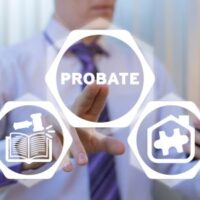Probate Cases Where Legal Problems Are Part of the Defendant’s Legacy

The beneficiaries of a deceased person will inherit the decedent’s property, but in some cases, they also inherit the decedent’s problems. Probate is a difficult task for the personal representative when the decedent left two versions of a will and it is unclear which one is valid, or when the decedent died owing large amounts in outstanding debts. You might think that an insolvent estate, where no one stands a fighting chance of inheriting except the decedent’s creditors, is the worst-case scenario, but there are probate cases that are worse than that, and even worse than the ones where a second spouse and that spouses children fight tooth and nail over a an estate. As unpleasant as these probate cases may be, they are child’s play compared to cases where the decedent was a defendant in a pending lawsuit and the assets are the only means of collecting on a judgment. If you are the personal representative of the estate of a family member whose legacy includes a mess of legal disputes, contact a Dade City probate lawyer.
Green v. Polukoff and Rule 1.260
Several years ago, an octogenarian named Renee Polukoff caused a car accident, and David Green, the driver of the car she hit, suffered serious injuries. Green filed a personal injury lawsuit against Polukoff, but Polukoff died while the case was pending. Green filed a motion for substitution of parties, requesting to make Polukoff’s estate replace her as the defendant, but a dispute ensued over which legal actions needed to take place and at what time so that the court could include Polukoff’s estate as a party in the case. Eventually, the appeals court ruled in Green’s favor, and he was able to proceed with his lawsuit.
Rule 1.260 is the rule governing substitution of parties in a pending lawsuit, meaning continuing the same lawsuit while replacing the original plaintiff with a new plaintiff or the original defendant with a new defendant. If the defendant dies during the pendency of the case, Rule 1.260 requires the plaintiff to petition the probate court to make the estate, as represented by its personal representative, the new defendant. The plaintiff has 90 days to do this, but what must the plaintiff do in those 90 days? This ambiguity was the cause of the dispute.
What is clear is that the plaintiff must petition the court to appoint a personal representative of the decedent’s estate so that the personal representative can engage in the lawsuit. This is easy enough, unless the defendant’s family intentionally creates delays. The trial court originally dismissed Green’s lawsuit because Polukoff’s family took too long appointing a personal representative. The court reinstated Green’s lawsuit after the appeals court ruled that he had fulfilled his obligations and the delays were not because of his actions or inaction.
Contact a Florida Estate Planning Attorney About Estate Disputes Beyond Probate Court
A probate attorney can help guide you through the probate process if the person whose estate you are representing was a defendant in a lawsuit. Contact The Law Office of Laurie R. Chane in Dade City, Florida to discuss your case.
Source:
flprobatelitigation.com/wp-content/uploads/sites/837/2024/05/Opinion_2022-2818.pdf

